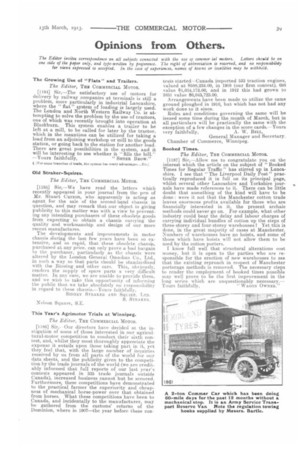Opinions from Others.
Page 21

If you've noticed an error in this article please click here to report it so we can fix it.
The Editor invites correspondence on all subjects connected with the use or commer ial motors. Letters should be on
one side of the paper only, and type-written by preference. The right of abbreviation is reserved, and no responsibility for views expressed is accepted. In the case of experiences, names of towns or localities may be withheld.
The Growing Use of "Flats" and Trailers.
The Editor, THZ COMMERCIAL MOTOR.
[1184] Sir,—The satisfactory use of motors for delivery by railway .companies at terminals is still a problem, more particularly in industrial Lancashire, where the " flat" system of loading is largely used. The London and North Western Railway Co. is attempting to solve the problem by the use of tractors, one of which was recently brought into operation at Blackburn. This system enables a trailer to be left at a mill, to be called for later by the tractor, which in the meantime can be utilized for taking a load from an adjoining workshop or mill to the goods station, or going back to the station for another load. There are great possibilities in the system, and it will be interesting to see whether it "fills the bill." —Yours faithfully, "SHEER BROW." fFeT some branches of trade, the system ha., many advantage,_End
Old Straker-Squires.
The Editor, THE COMMERCIAL MOTOR.
[1185] Sir,—We have read the letters which recently appeared in your journal from the pen of Mr. Stuart Curzon, who apparently is acting as agent for the sale of the second-hand chassis in question, and may remark that our object in giving publicity to this ntatter was with a view to preventing any intending purchasers of these obsolete goods from expecting to obtain a chassis carrying the quality and workmanship and design of our more recent manufactures.
The developments and improvements in motor chassis .during the last few years have been so extensive, and so rapid, that these obsolete chassis, purchased at any price, can only prove a. bad bargain to the purchaser, particularly as the chassis were altered By the London General Omnibus Co., Ltd., in such a way so that parts should be standardized with the Bussing and other cars. This, obviously, renders the supply of spare parts a very difficult matter. In any case, we are unable to provide them, and we wish to take this opportunity of informing the public that we take absolutely no responsibility in regard to these chassis.—Yours faithfully,
SIDNEY STRAKER AND SQUIRE, LTD.
S. STRAKER.
Nelson Square, S.E.
This Year's Agrimotor Trials at Winnipeg.
The Editor, THE COMMERCIAL MOTOR.
[1186] Sir,-Our directors have decided at the instigation of some of those interested in our agricultural-motor competition to conduct their sixth contest, and, whilst they most thoroughly appreciate the expense it entails upon those taking part in it, yet they feel that, with the large number of inquiries received by us from all parts of the world for our data sheets, and the publicity given to the competition by the trade journals of the world (we are creditably informed that full reports of our last year's contests appeared in 335 trade journals outside Canada), increased business cannot but be secured. Furthermore, these competitions have demonstrated to the practical farmer the superiority and cheapness of mechanical horse-power over that obtained from horses. What these competitions have been to Canada, and incidentally to the manufacturer, may he gathered from the customs' returns of the Dominion, where in 1907—the year before these con tests started—Canada imported 533 traction engines, valued at $588,234.00, in 1908 (our first contest), 698 value $1,034,172.00, and in 1912 this had grown to 3831 value $6,043,723.00.
Arrangements have been made to utilize the same ground ploughed in 1910, but which has not had any work done to it since. Rules and conditions governing the same will be issued some time during the month of March, but in all particulars will be practically the same with the exception of a few changes in the score cards.—Yours
very faithfully, A. W. BELL,
Chamber of Commerce, Winnipeg.
Booked Times.
The Editor, THE COMMERCIAL MOTOR.
[1187] Sir,—Allow me to congratulate you on the interest which the article on the subject of " Booked Times for Regular Traffic" has stirred up in Lancashire. I see that "The Liverpool Daily Post" practically reproduced it in full on its principal page, whilst several other Lancashire and Yorkshire journals have made references to it. There can be little doubt that something of the kind will have to be done : were it not that the Manchester cotton trade leaves enormous profits available for those who are financially interested in it, the present archaic methods could never go on. For example, what other industry could bear the delay and labour charges of carrying individual bundles of cotton up the steps of three-storey and four-storey warehouses Yet this is done, in the great majority of cases at Manchester. Numbers of warehouses have no hoists, and some of those which have hoists will not allow them to be used by the cotton porters. I know full well that structural alterations cost money, but it is open to the parties who are responsible for the erection of new warehouses to see that the existing reproach in respect of Manchester porterage methods is removed. The necessary steps to render the employment of booked times possible may well prove to be the first improvement in the long series which are unquestionably necessary.— Yours faithfully, "WAGON OWNER."
























